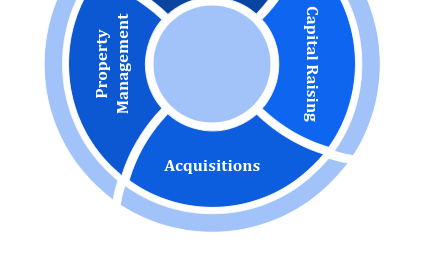8 Business Principles from a 28 year old Real Estate Private Equity Fund Founder
From Investment Banking to Private Equity to founding a Real Estate Private Equity Fund at 26, MyMBA’s first Industry Partner, Austin Nissly, provided great insight in MyMBA’s first biweekly meeting. MyMBA is an alternative MBA program where a group of professionals takes business classes online, creates websites to show their learning, and meets with industry leaders (our current group has 9 Members).
Austin's Fund, Keystone Investors, currently has $8 million of investor equity invested across 7 buildings (64 units) in Los Angeles, totaling ~$20 million in total asset value. The equity investment comes from over 75 individual investors.
In addition to telling his story, answering questions, and making further connections for Members based on their career goals, Austin taught us his 8 Business Principles. I have listed out my summary:
The Jar Analogy: Rocks, Pebbles, and Sand. If you want to fill a jar with rocks, pebbles, and sand, you can only succeed by putting the rocks in first, followed by the pebbles, followed by the sand. If you put the sand and pebbles in first, there won’t be any room for the rocks. The same is true with business and life. Focus on the big, important things first. These are the rocks. Don’t spend your time worrying about completing sand level tasks. Start your day with the most difficult, important task. Tip to put this into practice: Don’t check emails or texts until 11am. Instead, knock out one of the “rocks” on your to-do list.
Always be closing. Austin admits that this is a cliche sales phrase, but it’s a core part of his success. When raising money for Keystone, he prioritizes closing. He ensures that he always receives a yes or no answer from the people he pitched his investment thesis. Austin also gave a helpful example from his time in Investment Banking. He would always ask his MD to sit in on client meetings. Often they would say no, but sometimes they would say yes and he got invaluable exposure to the client. Austin emphasizes that closing often simply means asking for what you want.
Flywheels. Take the time to understand the flywheels in your life and business. Flywheels are about compounding growth. What processes can you implement in your business and life that will build on past successes? (I've also written about flywheels before: Personal Flywheel). Austin’s flywheel for Keystone Investors is as follows: If Austin has great investor relations, Austin will be able to raise capital. If he raises capital, Austin will be able to make great acquisitions. If he makes great acquisitions, he will be able to efficiently and effectively property manage. If he has great property management, he will be able to generate great returns. If returns are great, he will improve his investor relationships. This process compounds on itself.

Network. Networking is essential to any successful business person. Austin stresses the importance of identifying your main networks (hometown, college, previous jobs, etc.). Do the hard work to maintain these relationships. Find ways to stay in contact with these people. Austin’s real estate business gives him a great way to have continuous conversations with his network.
Call your “Chicken List.” This was my favorite point from our conversation. Austin calls a “chicken list” the people in your network that you are afraid to make contact with - a past relationship that didn’t end on the right note, a manager that you didn’t click with. Austin’s advice is simple. Call your chicken list. Swallow your pride, and reach out to these people.
Asymmetric Risk. Take risks with low downside and high upside potential. When starting Keystone, Austin invested in a 4 unit building in LA. The risk was actually smaller than you might think. Worst case scenario, he owned a building with 20 investors that he could sell back to the market and continue working his job. On the other hand, the upside was huge. He could gain experience buying a property, he could learn the best practices for property management, he could prove to later investors that he had experience buying a property and capturing a great return in the LA real estate market. This provided the foundation to raise additional funds for Keystone.
Start small. Austin stresses the importance of taking that first baby step. If you want to start a business, start selling one product. If you want to be an investor, invest in one asset. If you want to be a writer, start a blog and write an article. Start now, learn, and build a reputation.
Don’t forget where you came from. Never forget your upbringing, your values, and where you came from.
Austin was an unforgettable first MyMBA Industry Partner. Even as his younger brother, I felt I came away inspired and more knowledgeable about starting a business and general work principles.



